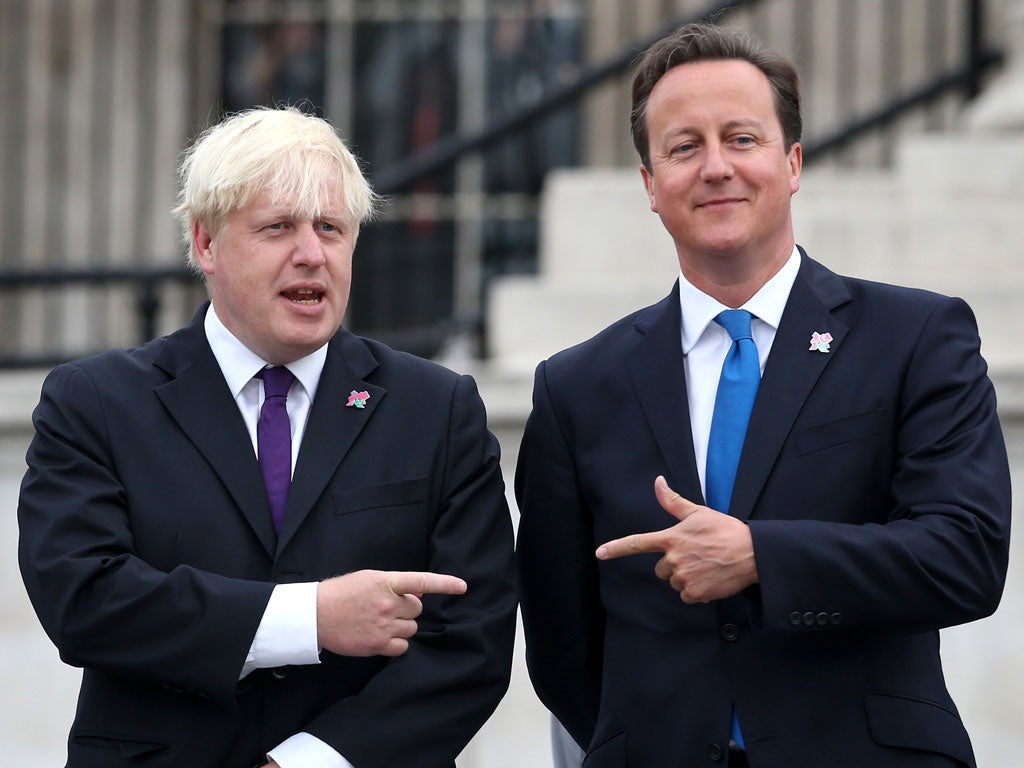Boris and David are now best friends – but for how long?
Boris will be trustworthy as long as it is in his interests to be trustworthy

Something disconcerting has happened inside the Tory party. Peace has broken out between Boris Johnson and David Cameron. The Prime Minister has welcomed the idea of the Mayor of London returning to the Commons in 2015, and has declared that the two of them “can make a very strong team”. Johnson has urged Tory activists to work “flat out” for victory in 2015, and has acclaimed Cameron as a “statesman”.
The British press cannot be expected to accept this outbreak of harmony without making determined efforts to destroy it. We thrive on rifts and rivalries. Johnson’s insatiable desire to lay his hands on Cameron’s job is a staple of our trade, and we are not going to give it up just because the two men now claim to be united in a common endeavour.
The question arises of whether Johnson’s protestations of loyalty can be trusted. As his biographer, my reply is that he will be trustworthy as long as it is in his interests to be trustworthy. This is not meant to sound disparaging. It describes the usual attitude of Tory MPs to their leaders. When Margaret Thatcher was judged to have become an electoral liability, they chucked her overboard, and they will do the same to Cameron when he is judged to have become a liability.
Johnson judges, as many Conservatives do, that things could be coming right for Cameron. The economy appears to be recovering, the welfare reforms are popular and Labour’s lead is soft. The Tories believe that by turning to the left, Ed Miliband has blundered. They reckon that as the general election approaches, Ukip voters will return to the Tories in order to avert the danger of Miliband becoming Prime Minister.
These assumptions may turn out to be mistaken. But for the time being, they have rendered Cameron’s position very much stronger. There is no vacancy in 10 Downing Street and Johnson knows he would do himself mortal damage if he were seen trying to create one. In Manchester, he has instead gone out of his way to demonstrate that he is a team player.
The Tory general election campaign in 2010 was a dreadful mess. About four different people were in charge of it, or not in charge of it, and no clear message emerged. Johnson was scarcely deployed: I remember a joint appearance he made with Cameron at Chelsea Royal Hospital which became an amusing, but electorally futile, series of jokes by Johnson at his leader’s expense. Lynton Crosby, who imposed iron discipline on Johnson during his two successful mayoral contests, will be running the Tory campaign in 2015, and will not allow that sort of thing to happen again. As long as Cameron looks as if he is a winner, Johnson will be forced to remain loyal. The first big test of this conditional loyalty will probably come in next year’s European elections.
Andrew Gimson is a contributing editor to ConservativeHome and the author of ‘Boris – the Rise of Boris Johnson’

Join our commenting forum
Join thought-provoking conversations, follow other Independent readers and see their replies